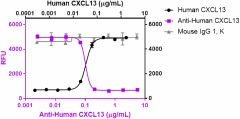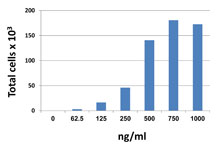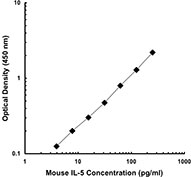- Clone
- A15151D (See other available formats)
- Regulatory Status
- RUO
- Other Names
- B cell attracting chemokine (BCA-1), B lymphocyte chemoattractant
- Isotype
- Mouse IgG1, κ
- Ave. Rating
- Submit a Review
- Product Citations
- publications

-

Recombinant human CXCL13 (black circles) (Cat. No. 574706) induces the chemotaxis of mouse Baf3-hCXCR5 transfectants chemoattractant cells. Ultra-LEAF™ purified anti-human CXCL13 (BLC) antibody (purple squares) (clone A15151D) neutralizes the chemotactic activity of recombinant human CXCL13 on mouse Baf3-hCXCR5 cells in a dose-dependent manner while the isotype control (grey triangles) (Cat. No. 400165) does not have the effect. ND50 range: 0.1 - 1.5 µg/mL.
| Cat # | Size | Price | Quantity Check Availability | Save | ||
|---|---|---|---|---|---|---|
| 934503 | 100 µg | £185 | ||||
| 934504 | 1 mg | £490 | ||||
CXCL13 was initially described as a chemokine highly expressed in the follicles of Peyer's patches, spleen, and lymph nodes and as a strong chomoattractant for B cells. CXCL13 is expressed by T follicular helper cells, dendritic cells, and stromal cells in B cell areas of secondary lymphoid tissue. CXCR5, the receptor for CXCL13, was initially cloned from Burkitt’s lymphoma cells and named BLR1. CXCR5 is highly expressed in those cells and B cells. CXCL13, CCL19, and CCL21 are involved in the formation of tertiary lymphoid tissues in chronic antigen-induced arthritis. CXCL13 takes part in the allergic airway inflammatory process. In addition, high expression of CXCL13 has been linked to lupus, Helicobacter pylori-associated gastritis, multiple sclerosis, and rheumatoid arthritis. In summary, CXCL13 is highly expressed at the sites of new lymphoid tissue formation in a variety of chronic inflammatory conditions.
Product DetailsProduct Details
- Verified Reactivity
- Human
- Antibody Type
- Monoclonal
- Host Species
- Mouse
- Immunogen
- Recombinant Human CXCL13
- Formulation
- 0.2 µm filtered in phosphate-buffered solution, pH 7.2, containing no preservative.
- Endotoxin Level
- Less than 0.01 EU/µg of the protein (< 0.001 ng/µg of the protein) as determined by the LAL test.
- Preparation
- The Ultra-LEAF™ (Low Endotoxin, Azide-Free) antibody was purified by affinity chromatography.
- Concentration
- The antibody is bottled at the concentration indicated on the vial, typically between 2 mg/mL and 3 mg/mL. Older lots may have also been bottled at 1 mg/mL. To obtain lot-specific concentration and expiration, please enter the lot number in our Certificate of Analysis online tool.
- Storage & Handling
- The antibody solution should be stored undiluted between 2°C and 8°C. This Ultra-LEAF™ solution contains no preservative; handle under aseptic conditions.
- Application
-
Neut - Quality tested
- Recommended Usage
-
Each lot of this antibody is quality control tested by neutralization of the chemotaxis induced by recombinant human CXCL13 on mouse Baf3-hCXCR5 transfectants chemoattractant cells. ND50 range: 0.1 - 1.5 µg/mL. It is recommended that the reagent be titrated for optimal performance for each application.
- Product Citations
-
- RRID
-
AB_2832886 (BioLegend Cat. No. 934503)
AB_2832887 (BioLegend Cat. No. 934504)
Antigen Details
- Structure
- Chemokine
- Distribution
-
Follicular dendritic cells, monocytes, macrophages, and stromal cells from germinal centers. CXCL13 is derived from endothelial cells, synovial fibroblasts, and follicular dendritic cells in RA.
- Function
- CXCL13 chemoattracts B cells and is a key chemokine for B cell entry into lymphoid follicles. It also takes part in the formation of ectopic lymphoid tissue in chronic inflammation. CXCL13 production by follicular Th cells is induced by TCR activation.
- Interaction
- B cells and follicular helper CD4 T cells
- Ligand/Receptor
- CXCR5 (CD185)
- Cell Type
- B cells, Macrophages, T cells
- Biology Area
- Cell Biology, Immuno-Oncology, Immunology, Signal Transduction
- Molecular Family
- Cytokines/Chemokines
- Antigen References
-
- Gunn MD, et al. 1998. Nature. 391:799.
- Legler DF, et al. 1998. J Exp Med. 187:655.
- Kim CH, et al. 2004. Blood. 104:1952.
- McDonald KG, et al. 2010. Am J Pathol. 176:2367.
- Gatto D, et al. 2011. J Immunol. 187:4621.
- Gene ID
- 10563 View all products for this Gene ID
- UniProt
- View information about CXCL13 on UniProt.org
Related FAQs
- Do you guarantee that your antibodies are totally pathogen free?
-
BioLegend does not test for pathogens in-house aside from the GoInVivo™ product line. However, upon request, this can be tested on a custom basis with an outside, independent laboratory.
- Does BioLegend test each Ultra-LEAF™ antibody by functional assay?
-
No, BioLegend does not test Ultra-LEAF™ antibodies by functional assays unless otherwise indicated. Due to the possible complexities and variations of uses of biofunctional antibodies in different assays and because of the large product portfolio, BioLegend does not currently perform functional assays as a routine QC for the antibodies. However, we do provide references in which the antibodies were used for functional assays and we do perform QC to verify the specificity and quality of the antibody based on our strict specification criteria.
- Does BioLegend test each Ultra-LEAF™ antibody for potential pathogens?
-
No, BioLegend does not test for pathogens in-house unless otherwise indicated. However, we can recommend an outside vendor to perform this testing as needed.
- Have you tested this Ultra-LEAF™ antibody for in vivo or in vitro applications?
-
We don't test our antibodies for in vivo or in vitro applications unless otherwise indicated. Depending on the product, the TDS may describe literature supporting usage of a particular product for bioassay. It may be best to further consult the literature to find clone specific information.
Other Formats
View All CXCL13 Reagents Request Custom Conjugation| Description | Clone | Applications |
|---|---|---|
| Ultra-LEAF™ Purified anti-human CXCL13 (BLC) | A15151D | Neut |
Customers Also Purchased
Compare Data Across All Formats
This data display is provided for general comparisons between formats.
Your actual data may vary due to variations in samples, target cells, instruments and their settings, staining conditions, and other factors.
If you need assistance with selecting the best format contact our expert technical support team.
-
Ultra-LEAF™ Purified anti-human CXCL13 (BLC)

Recombinant human CXCL13 (black circles) (Cat. No. 574706) i...
 Login / Register
Login / Register 







_100913.jpg)




Follow Us